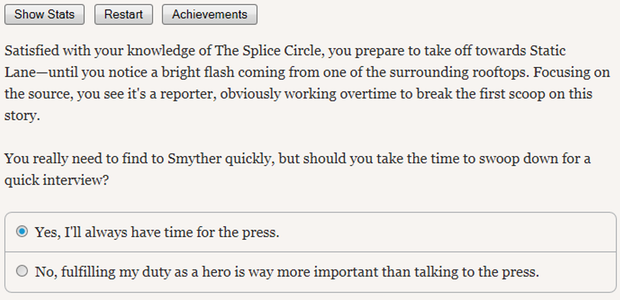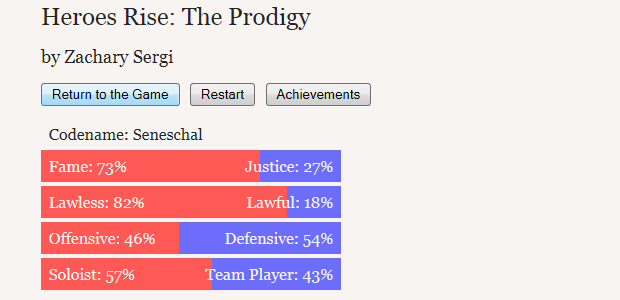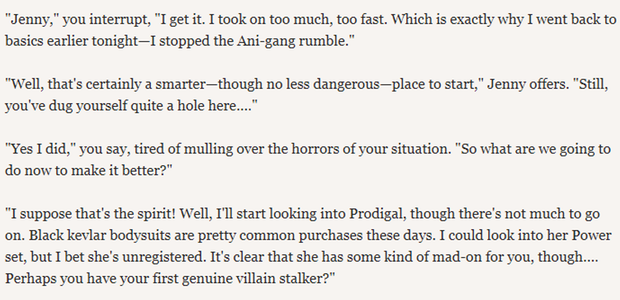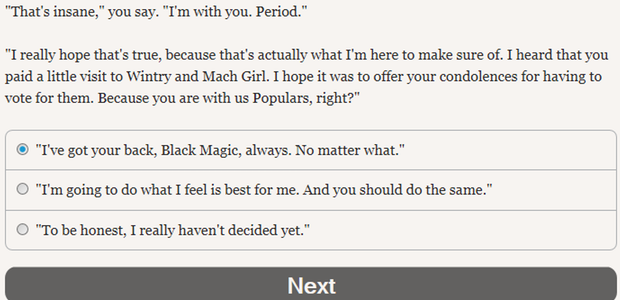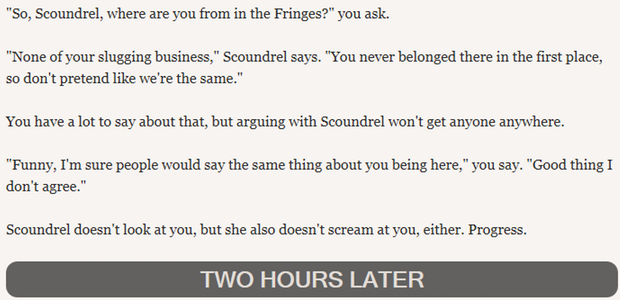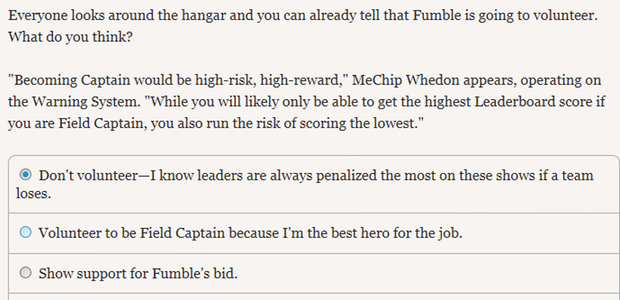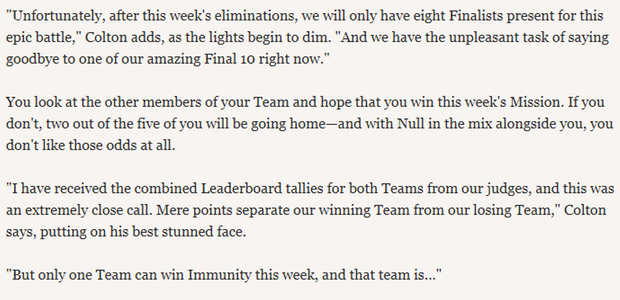Wot I Think: Heroes Rise: The Prodigy / The Hero Project
Justice League of Helvetica
Heroes Rise proudly declares itself the first text adventure on Steam. Pffft. Reading words? On a screen? That someone wrote? Who's got time for that nonsense, eh? What's that, Graham? I do what for a living? Ah. I have just been informed that I was just kidding. Who needs graphics anyway? But! Do its first two parts have the power to overclock and fully exploit the most powerful gaming processor in the world, the Intel i7 47YOUR MOIST HUMAN BRAIN? Here's Wot I Think...
If there's one thing that deconstructionist superhero fiction should have hammered in by now, it's that we should probably be glad we don't have heroes amongst us. Superpowers come in many forms, but supers? At least 99.9% shitweasel, and the ones who aren't are usually too busy being picked on and sneered at to make the difference to the world that they dream of. In Heroes Rise, you're both the plucky newcomer to the world of capes and cowls and the child of a disgraced husband-and-wife duo. Honestly, you may as well just get it over with and give yourself the super-wedgie and stick your head down the toilet every morning. Not that it'll be close to the worst thing that happens to you on the long path to fame, glory, and one day maybe even getting your parents out of hero prison.
The first part, The Prodigy, is largely an origin story, focusing on your first nights patrolling the streets. "You" is pleasantly malleable, with energy and flight powers locked in, but a choice of both gender and sexuality (primarily affecting two characters - one of whom is always your stated preference, another a handful of interactions with your best friend Jenny, who is always lesbian) and a few completely open options that just beg to abused, like which celebrity crush your potential love interest Black Magic happens to look exactly like. Certainly, later on several emotional moments were somewhat defused by lines like "You stare into the night sky, clutching your parents' prized ring and hoping that they are proud of you. In your head, you hear their beloved song, its lyrics carved into the surface as a symbol of their love and duty... Agadoo, agadoo, push pineapple, shake a tree."
I can't help but feel at least partially responsible. But I digress.
Once suited, booted and out on patrol, the real game begins. As you can see in the screenshots, Heroes Rise isn't the classic type of text adventure, with a parser, but one where options are presented in a list form so spartan that it could probably hold a pass against the Persian army. It looks incredibly boring, with its stock HTML elements barely touched by the decorative hand of basic CSS styling, never mind anything more atmospheric. This may be the first text adventure on Steam, but elsewhere games like Sorcery, the other Inkle releases, Fallen London and even Cypher have demonstrated what a little graphical loving can do to even the wordiest games' atmospheres. This engine though is primitive even as a pure, basic text viewer. You can't even officially do anything as simple as make the text larger (though CTRL and the mousewheel will do it), or change colours for night-time play or something more soothing on the eyes than classic black on white.
What really matters though is the writing. Taking these in order, The Prodigy is okay, but not great. One of its biggest failings is the setting, which largely assumes that a city full of superheroes is intrinsically interesting - and yes, it's a cool starting point. But it's also a genre containing, to pick a few random ones off the top of my head, Powers, The Tick, City of Heroes, Soon I Will Be Invincible, Mystery Men and Empowered. All of those have some element that makes them stand out, from a dark setting all the way to ludicrous fan-service, while Heroes Rise's "Millennia City" is as bland and uninspired as its name. There's no snap to it, little atmosphere, and not enough time with the majority of even main characters to make them anything more than a name and a couple of traits.
(You also have to get used to the word 'slugger' as a jarring, all purpose swear replacement, which is frelling ridiculous when we could have had a 'grown up rude words y/n?' option.)
The Prodigy's best asset by far is how pacey it is, with each text burst short, to the point, easily digested, and with plenty of options that do - to some extent - affect how things play out. The basic storyline is on a rail, and somewhat frustrating for both how often you're forced into blatantly stupid decisions, and how much everything revolves around one of those really annoying villains who would go "Just as planned!" if they got hit by a car on their way to buy a baguette.
Despite that though, it does a decent job of responding to your decisions and at least providing the illusion of control. Early on for instance you're caught in a compromising position at a crime scene and have to decide whether or not to flee and maintain anonymity, or stick around and explain things to the cops. Sticking around earns a friend on the force, who then gets integrated into the narrative and provides support both directly, and as a card to play when dealing with other cops. Other options likewise slide in as needed, including your choice of sidekick (not that having one makes a whole lot of sense) and relationships with rather more established heroes and villains.
Decisions also affect stats thoughout, including a straight-up score, but also what kind of hero you develop into - a law-abiding cape vs. a more vigilante cowl for instance, a team player versus a lone wolf - and you're rewarded for sticking with one rather than specifically penalised for getting a little bit rough. After all, both Superman and Batman are respected for getting the job done, but it'd still make a few waves in the superhero community if someone caught the Big Blue Boy Scout threatening to squeeze some guy's balls hard enough to turn them into diamond cufflinks. For the most part you just end up disabling crooks rather than killing them, but there are a couple of moments where you can, and get to choose how you feel about having done so. These touches also extend to the overall consequences, like whether or not the local superteam decides to offer you a spot - and if you care - and how much damage the vile villain ultimately manages to do in the endgame.
The nature of the story does sometimes make this frustrating, with your hero having an annoying tendency to just seize control, for the universe to nullify many decisions when they don't, and to repeatedly come across as a complete moron who can't pick up on a basic clue when it is literally written on a goddamn wall. At other times, it simply assumes too much, especially in a couple of the big decisions near the end, that are all the more noticeable in a series that usually bends over backwards to ask "Why did you do that? How did that make you feel?" after every big event.
Even so, it generally works as well as it needs to, and the big decisions do feel suitably weighty. Both Heroes Rise games also only offer a single autosave (with a savegame at the end for character porting) and are pretty long adventures on your first run through, meaning that you're stuck with your decisions both for the rest of the game, and potentially the rest of the series. Even knowing that the story would largely continue unimpeded, I definitely found myself thinking about the best thing to do and which characters to keep close and who to trust or betray - particularly in the second game, which we'll get to in a moment. That said, like The Walking Dead, I don't recommend replaying to try other options. They are there, and decisions do count, but only to a point, and one best left a mystery.
Overall though, The Prodigy is a passable adventure in both senses of the word. It's okay, with an uninspired concept that it does a decent job executing, but nowhere close to the top tier of modern interactive fiction. Still, its pace and ease of play make it a not-bad introduction to the genre, and it does fittingly sometimes get to rise above its limitations with a good emotional moment or satisfying decision. Especially if you play things straight when it asks for things like romantic song lyrics.
The sequel however... that's a far more ambitious story.
I can't recommend playing The Hero Project on its own, there are too many connections between the games to just jump in, but it's a much more assured and generally more successful game. Exactly what it's successful at can be an issue though, with very little of the heroism I expected in a game whose title uses the word 'Hero' twice. But then, that ends up being kind of the point.
Without wanting to spoil the end of the first game, this one picks up a few months on and your heroic life continues to be a cosmic practical joke interrupted only by failure. Luckily, there's a new way for a young hero to make a name for themselves - America's Got Powers! No, wait, sorry. The Hero Project, a new government sponsored reality show where the only thing standing in the way of your glory is that it's being run by a Who's Who of people who for various reason hate your guts.
In short: Yaaaaaaaaaaaaaaaaaaaay!
The Hero Project is a far, far more complex game than The Prodigy, though at times self-defeatingly so. The reality show premise means a ridiculous number of characters to keep in your head, each with powers and split into factions that have to be kept in mind when making friends and placing your votes. Even with notes available, it's an effort to keep track of it all. And that's just one of the many stories running at the same time and weaving in and out of the various rounds and relationships - a worldwide rise of anti-Powered sentiment that you end up in the middle of, your family's biggest enemy on the road to becoming President, your best friend Jenny going undercover and constantly asking for your help at the expense of your chances on the show, several different conspiracies... it's narrative overkill. At the same time though, it does suitably convey the swirling pace of being completely out of your depth, with the artificial nature of the show helping to smooth over and justify much of the more obvious railroading. What the producer wants, the producer shall get.
When it comes to games with a heavy focus on decisions, the first playthrough is always the most important - after that, you can't help but see the strings. The Hero Project does a great job here, constantly demanding snap decisions and far more political thinking than simply good and evil - whether or not for instance you might be able to befriend a rival, whether the secrets of the show are more important than actually winning it, and crucially, what kind of hero you both are and want to present yourself as. As with the first game, The Hero Project cares more that you're consistent about it than that you go along with its specific definition of a hero, with both your options and your fellow contestants covering a wide range of personalities and hero styles. Leader. Support. Mediator. Wildcard. It's rare not to find a roleplaying option for any character archetype in the available choices, or at least any that could have emerged from the main character's fixed past and power-set.
(Unless you want to be a hero who actually goes out and fights crime, of course. Everyone's far too busy beating each other up in simulations and having childish squabbles for that.)
On the whole, The Hero Project is a much better written game than its predecessor, and certainly has more character and drama. Sometimes it comes from the show, waiting to see who gets voted off and having the power to get rid of people yourself (the main characters are plot armoured, of course, but you do get a say, and can be kicked off the show yourself depending on decisions) and at other times from the much more integrated combat. I didn't really mention it when talking about the first game, because while it's present, it's also more or less an irrelevance. You can apparently die, but you'd really have to work at being that rubbish a hero - I did, and I still barely scratched my spandex while speeding to the end during a replay. At no point are you ever likely to run low on power points or notice the effect of any of the additional items you can pick up, turning most fights into a straight question of whether you shut your rival down with energy, flight, or old fashioned fisticuffs.
The Hero Project uses the same broad system, with the addition of another power set unlocked during the first game, but makes it much more involved. Now fights tend to be longer and demand more power use, as well as moments where you give other characters orders and have to try and work out the best approach based on what you know about the opponent's own powers - to take a ranged approach against a melee fighter for instance, or find an illusionist in the crowd. Or at least, ideally you do. You can also buy a 'Warning System' for 79p (real money) which comprehensively ruins most of the game by just outright telling you what to do. Do not buy the Warning System.
Inevitably though, the real combat is social. The characterisation is far more effective this time around, with conflicts and decisions coming from every direction - whether for instance to bond with and trust reformed supervillain The Crush (no, names are not this series' forte), to hang with the cool kids instead of the underdogs, and how much to embrace your potentially world-shattering powers when everyone is already scared of regular superheroes. The big mysteries of the show are also sold well, with potential suspects everywhere and some very well timed twists and turns if you can ignore the fact that most of the people in the game are absolutely awful and the idea of being on a team with really any of them is about as tempting as getting a testing job in an enema factory.
Even so, head does have to meet desk at several points, in big plot beats (like a decision that you'd have to have an emptier head than Captain Brainless to fall for, despite the game clearly thinking it's being cunning), in some bizarre character shifts with the romantic characters especially (Black Magic is barely recognisable in this one), and in individual moments that bite off far more than the writing level can chew. In particular, a debate with some anti-Powered crusaders in which both sides could be schooled by the average sixth form debating society, and a no better handled argument over homosexuality that comes out of nowhere, engraved on the side of an anvil. It's not that it couldn't work, but it doesn't, as the characters turn into mouthpieces for a scene that's less 'dramatic moment' than 'full-on author filibuster'. And he's still needed for the third Hobbit film.
I liked The Hero Project a lot more than its predecessor, and even with its problems it's a big step down the right path. Neither is honestly a game I'd point people towards as the prime example of what text can still do in this day and age, but they're fun, cheap, a satisfying length, and whip along well enough that while it's hard to ignore the clumsiness and issues with both of them, it's not really until the end that you have time to care. If you've read the superhero stories that Heroes Rise wants to be, you're not likely to be blown away by its take. If not though, or you don't mind occasionally indulging a game that's visibly learning the ropes along with its main character, you can definitely do worse. I am planning to keep my save to see what happens, and if any of my decisions so far lead to any neat surprises in the third game, Herofall, which is due in July.
Both games offer online demos to check out - The Prodigy here, and The Hero Project there. The same site also houses a whole lot more games using the same engine that aren't currently on Steam, but are available in the Chrome Web Store, on Kindle, and for mobile devices.


